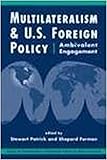Multilateralism and U.S. Foreign Policy : Ambivalent Engagement / ed. by Shepard Forman, Stewart Patrick.
Material type: TextSeries: Center on International Cooperation Studies in MultilateralismPublisher: Boulder : Lynne Rienner Publishers, [2023]Copyright date: ©2002Description: 1 online resource (509 p.)Content type:
TextSeries: Center on International Cooperation Studies in MultilateralismPublisher: Boulder : Lynne Rienner Publishers, [2023]Copyright date: ©2002Description: 1 online resource (509 p.)Content type: - 9781588260420
- 9781685855048
- online - DeGruyter
| Item type | Current library | Call number | URL | Status | Notes | Barcode | |
|---|---|---|---|---|---|---|---|
 eBook
eBook
|
Biblioteca "Angelicum" Pont. Univ. S.Tommaso d'Aquino Nuvola online | online - DeGruyter (Browse shelf(Opens below)) | Online access | Not for loan (Accesso limitato) | Accesso per gli utenti autorizzati / Access for authorized users | (dgr)9781685855048 |
Frontmatter -- Contents -- Acknowledgments -- Part 1: Setting the Context -- 1. Multilateralism and Its Discontents: The Causes and Consequences of U.S. Ambivalence -- Part 2: Dimensions of U.S. Multilateralism -- 2. The United States, International Organizations, and the Quest for Legitimacy -- 3. The Growing Influence of Domestic Factors -- 4. Public Attitudes Toward Multilateralism -- 5. Multilateralism and U.S. Grand Strategy -- 6. U.S. Unilateralism: A European Perspective -- Part 3: Policy in Practice -- 7. Unilateral Action in a Multilateral World -- 8. Multilateral Peace Operations -- 9. Nuclear Weapons: The Comprehensive Test Ban Treaty and National Missile Defense -- 10. The Chemical Weapons Convention -- 11. The United States as "Deadbeat"? U.S. Policy and the UN Financial Crisis -- 12. Extraterritorial Sanctions: Managing "Hyper-Unilateralism" in U.S. Foreign Policy -- 13. Unilateralism, Multilateralism, and the International Criminal Court -- 14. Why Is U.S. Human Rights Policy So Unilateralist? -- 15. Ambivalent Multilateralism and the Emerging Backlash: The IMF and WTO -- 16. Climate Change: Unilateralism, Realism, and Two-Level Games -- Part 4: The Future of Multilateral Cooperation -- 17. Multilateralism as a Matter of Fact: U.S. Leadership and the Management of the International Public Sector -- Acronyms and Abbreviations -- Bibliography -- The Contributors -- Index -- About the Book
restricted access online access with authorization star
http://purl.org/coar/access_right/c_16ec
When should the United States cooperate with others in confronting global problems? Why is the U.S. often ambivalent about multilateral cooperation? What are the costs of acting alone? These are some of the timely questions addressed in this examination of the role of multilateralism in U.S. foreign policy. The authors isolate a number of factors that help to explain U.S. reluctance to commit to multilateral cooperation. They then analyze recent policy in specific areas—e.g., the use of force, peacekeeping, arms control, human rights, the United Nations, sanctions, international trade, environmental protection—probing the causes and consequences of U.S. decisions to act alone or opt out of multilateral initiatives. A concluding chapter underscores the point that increasingly pressing transnational problems may require the U.S. to reform its policymaking structures and to reconsider longstanding assumptions about national sovereignty and freedom of action.
Mode of access: Internet via World Wide Web.
In English.
Description based on online resource; title from PDF title page (publisher's Web site, viewed 02. Mai 2023)


